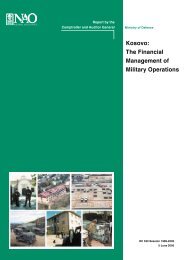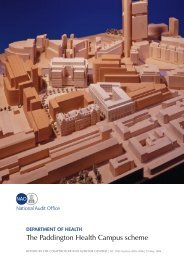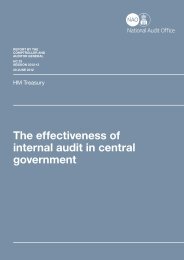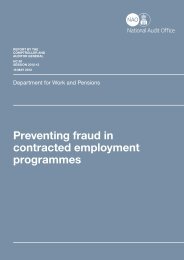Reducing bureaucracy for public sector frontline staff: Briefing for the ...
Reducing bureaucracy for public sector frontline staff: Briefing for the ...
Reducing bureaucracy for public sector frontline staff: Briefing for the ...
Create successful ePaper yourself
Turn your PDF publications into a flip-book with our unique Google optimized e-Paper software.
20 Part Two <strong>Reducing</strong> <strong>bureaucracy</strong> <strong>for</strong> <strong>public</strong> <strong>sector</strong> <strong>frontline</strong> <strong>staff</strong><br />
2.9 The Better Regulation Executive is also helping Departments to identify where<br />
<strong>bureaucracy</strong> can be reduced. An online portal, set up originally to ga<strong>the</strong>r suggestions<br />
<strong>for</strong> reducing <strong>bureaucracy</strong> from businesses, has been extended to provide ‘a voice <strong>for</strong><br />
<strong>frontline</strong> workers’ whereby <strong>staff</strong> can submit simplification proposals. Departments <strong>the</strong>n<br />
review <strong>the</strong> proposals and take <strong>the</strong>m <strong>for</strong>ward where possible. These proposals typically<br />
centre on encouraging more joined up working across government and greater use of<br />
time saving measures such as on-line applications.<br />
2.10 Departments have implemented initiatives to engage with <strong>frontline</strong> <strong>staff</strong>, particularly<br />
using gateway groups to consider <strong>the</strong> level of unnecessary <strong>bureaucracy</strong> on <strong>the</strong> <strong>public</strong><br />
<strong>sector</strong> and to reduce data streams. Some were set up in response to <strong>the</strong> <strong>public</strong><br />
<strong>sector</strong> strategy, <strong>for</strong> example, <strong>the</strong> Department of Health’s Streamlining Data Collections<br />
Board, while o<strong>the</strong>r Departments have used existing bodies to review data streams. For<br />
example, a panel comprising head teachers and local authority representatives, <strong>for</strong>med<br />
in <strong>the</strong> Department <strong>for</strong> Children, Schools and Families in 1999 has been revived and<br />
<strong>the</strong> Department intends <strong>the</strong> panel to act as gatekeepers of data. The use of dedicated<br />
groups to review data requests has also yielded results. (Figure 9) Some Departments<br />
are taking imaginative approaches to engaging with <strong>the</strong> <strong>frontline</strong>. For example <strong>the</strong><br />
Department <strong>for</strong> Children, Schools and Families has disseminated <strong>the</strong> key messages from<br />
its 2008 simplification plan into e-mail updates with circulation to over 32,000 schools.<br />
2.11 Departments have also sought to tackle <strong>bureaucracy</strong> through o<strong>the</strong>r measures<br />
such as improving in<strong>for</strong>mation technology systems, streamlining <strong>for</strong>ms and data sharing<br />
(Figure 10 provides some examples).<br />
Figure 9<br />
The Home Offi ce’s annual data requirement process <strong>for</strong> <strong>the</strong> police has<br />
yielded results<br />
Data provided by <strong>the</strong> police to <strong>the</strong> Home Office is set by an Annual Data Requirement process, by<br />
which <strong>the</strong> Home Office and <strong>the</strong> police <strong>for</strong>ces agree on <strong>the</strong> minimum data required to operate efficiently.<br />
The Department has imposed a moratorium on additions to <strong>the</strong> Annual Data Requirement until 2011 and<br />
has reduced <strong>the</strong> number of separate data requests each year so far; from 89 in 2007-08, to 82 proposed<br />
<strong>for</strong> 2009-10.<br />
Source: Simplification plans

















